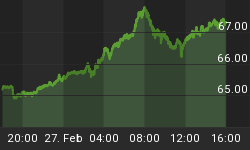Last week, the weak employment report helped justify the Fed's historic actions. It also provided more evidence that the economy has slowed and the likelihood of a recession has increased. The Labor Department reported that 17,000 jobs were lost last month. Economists were expecting a gain of 70,000. This was the first month that the economy shed workers since August 2003. Temporary employment dropped for the third consecutive month. This has been a good barometer as the labor market has weakened and does not bode well for the future outlook.
The latest ISM surveys piled on evidence that the economy is slowing and the likelihood of a recession has increased. The manufacturing sector increased 2.3 points to 50.7, but several components fell or remained under 50. With economists focused on the labor market, the fact that the employment index dropped 1.6 points to 47.1 provided some angst. It doesn't help that that was the lowest level since September 2003. The survey also proved that inflation is not just yesterday's problem. Prices paid jumped eight points to 76.0. It was the non-manufacturing survey that shocked economists. The survey measuring the service sector dropped 8.6 points to 44.6. Every component except export orders dropped and only three of the ten components were over 50. The prices paid index was one of those three. It dropped 0.8 points to 70.7, proving that businesses continue to expect prices to be inflationary. Employment dropped 7.9 points to 43.9. This was the first time both employment surveys have been below 50 since the summer of 2003.
Consumer confidence has plunged since the summer and while it started to stabilize during November and December, it has started dropping again. The ABC News Comfort Index dropped six points to -33 last week, which followed a four point drop the week before. This was the lowest reading since the economy pulled out of the recession in the early 1990s. The three components of the survey are all at multi-year lows. The state of the economy has dropped 54 points since last summer and is only two points above where it bottomed out during the start of Iraq war. On a historical basis, this is actually better than either the personal finance or the buying climate components. These are at the lowest point since April 1994 and July 1993, respectively.
Results from retailers also reveal that consumers are tepid. The weekly chain store sales results from ICSC have been below 2.0% for the past five weeks. This has been the weakest stretch since the summer of 2003. For January, the trade group has lowered its forecast from 1.5% to flat. The Wall Street Journal ran a story that said this would be the worse reading since 1969. Equity analysts are expecting same store sales to increase 1% according to Thomson. Excluding Wal-Mart, same store sales are expected to increase only 0.1%. Weak January sales are going to be problematic for retailers because the holiday season was weak as well. This caused retailers to discount their merchandise to drive traffic. Early indications suggest that consumers were not lured in by discounts. Retailers will have to get more aggressive with discounts since they will not want to have excess inventory when the spring season starts.
Sales of bigger ticket items are also stalled. January vehicle sales dropped to 15.2 million annualized units, down from 16.3 million units in December. Excluding a drop to 14.9 million units in October 2005, which followed the surge to 20.5 million when the automakers offered employee discounts fro everyone in 2005, this was the weakest sales since 1998.
We have said that the slowdown in consumer spending would happen once lenders quit lending. It has become very apparent that the credit environment has turned and has shut out the consumer. The most recent Federal Reserve survey of senior bank-loan officers found that over half the banks tightened lending standards for consumer loans. The survey found that banks have tightened lending standard for commercial loans as well. One-third of the banks surveyed tightened credit for commercial and industrial loans as well. Commercial real estate loans were tightened at 80% of the banks. Additionally, about half said they have widened their spread over their cost of funding.
While the Fed has lowered interest rates and will most likely continue to lower rates, banks are less willing to lend and are increasing the spread for loans. This will obviously curtail the impact of the rate cuts. If lending standards continue to tighten, the impact of the Fed cuts might be negligible. Unfortunately, with losses piling up on banks balance sheets along with leveraged loans from the M&A boom, this will be the most likely outcome.
Due to fund growth, I am going to be devoting more time to research and will not publish the Mid-Week Analysis for an indefinite period of time.















